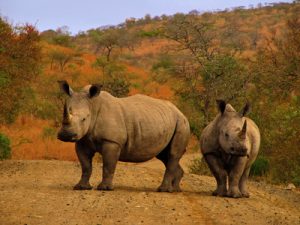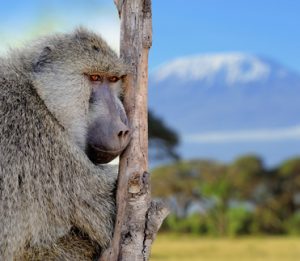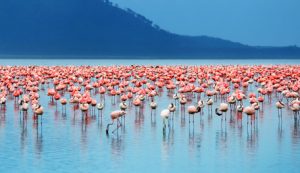African Wildlife and Conservation Studies Level 3
- The African Wildlife and Conservation Studies Diploma provides a good starting point for people wanting to work in wildlife management or conservation. This includes a variety of careers working in safari parks, educational centres and zoos.
- Learn about African Wildlife Ecology, Big Cat Conservation, African Herbivore Conservation, African Primate Conservation and the conservation of African Predators.
- There is particular emphasis on learning about the mammalian wildlife of the continent. Some avian and reptilian wildlife is also covered.
- Students will gain a thorough understanding of the basic principles of African wildlife ecology, conservation and management and explores the major ecological crises affecting African wildlife.
- The course explores the impacts that human population growth, deforestation, poaching & illegal trade, habitat destruction, pollution, etc have on African Wildlife. It also evaluates current practices and policies in African Wildlife Management.
*You will have access to the course for 12 months only. You can purchase course extensions.
Module 1
African Wildlife Ecology and Ecological Crises
Module 1 of the The African Wildlife and Conservation Studies Diploma studies African Wildlife Ecology. Learn about the concept of “ecosystem”: Terrestrial, aquatic, biological and physical components, interactions and dependency.
Learn about food chains and the effect of imbalances: Trophic levels, herbivores, carnivores, omnivores, predators and prey and imbalances.
Explore the major ecological crises affecting African wildlife. Learn about the effects of human population growth, deforestation, poaching & illegal trade, habitat destruction, pollution, & more.
Module 2
Big Cats of Africa
Learn about the conservation methods, habitats, evolution and origins of Big Cats. This module explores the biology and habitats of the three big cat species found in Africa.
Learn about African big cats, their geographic range and habits, appearances, lifespan, diet, habitat, behaviour, reproduction, parental care, social grouping, competitors and threats.
Learn about the conservation threats facing African big cats and the current practices & policies in managing big cats in Africa including: Hunting, poaching, habitat loss, poisoning/trapping, disease, legal protection, international legislation, nature reserves, education, eco-tourism, zoos & safari parks.
Learn about the methods of studying big cats in Africa including: Aerial surveys, tag/release, trapping (live & camera), total counts, waterhole counts, spoor & scat analysis, radiotelemetry, environmental marking, local people’s knowledge, kill identification, strengths & weaknesses of each method.
Module 3
Other African Predators
As per Module 2 of the African Wildlife Course, this module expands the view to include many more of the predators found in Africa and investigates their biology and ecology, with specific emphasis on the methods used to avoid or survive competition. This section includes wild dogs, hyaenas, birds of prey (including vultures), foxes, jackals, serval, caracal, aardwolf and wolves.
The role of scavengers in the ecosystem is explored, as are the conservation threats faced by some of the other African predators. Learn how competitors co-exist in the environment.
This section also explores the conservation threats to African predators including: Pollution, poaching, trapping, poisoning, habitat loss, competition and hunting.
Module 4
African Herbivores
This module of the African Wildlife Course explores the explore the basic biology and ecology of a number of herbivores commonly encountered in Africa.
Learn about the conservation & management issues affecting African herbivore populations including: Poaching, hunting, game farms, game meat, nature reserves, game capture, culling, exotic species, disease, predation, theft, habitat loss and migration routes.
Learn about the terminology used to describe African herbivores & outline their features including: Browsers, grazers, pachyderms, horse-like (equids), pig-like (porcine), antelope, gazelle and buck.
Learn about the biology & ecology of African herbivores including: Appearance, lifespan, diet, habitat, behaviour, reproduction, parental care, social grouping, competitors and threats/predators.
Module 5
African Primates
The module begins by illustrating the difference in various terms used to describe primates and then explores the basic biology and ecology of a number of case study species.
The conservation threats faced by these species are investigated and evaluated.
Learn about basic biology & ecology of African apes and African monkeys including: Appearance, lifespan, diet, habitat, behaviour, reproduction, parental care, social grouping, competitors, threats/predators.
Learn about the major conservation threats facing African apes, including: Bushmeat, habitat loss, poaching, wildlife trade, pollution, encroachment of human settlements, pest/vermin populations, disease, zoonoses and exploitation in eco-tourism.
Module 6
African Birds
This module explores the great variety of birds on the African continent, and their importance to African ecology and the threats they face.
African Wildlife and Conservation Studies
Without a shadow of a doubt the sheer range of wildlife in the African Wilderness is awe inspiring but the impact of human settlements on their natural habitats is equally undeniable and requires an ever increasing conservation effort to protect both living spaces. Finding unique solutions for harmonious cohabitation is a priority.
The African Wildlife and Conservation Studies Course has a wide-ranging focus and provides insights that could become catalysts for a sustainable future.
Who is the African Wildlife and Conservation Studies course suitable for?
The course is suitable for those seeking to expand their knowledge of African wildlife. It is an accredited course that supports the professional development of those working in zoos, safari parks, or those wanting to get involved directly in African conservation.
What will you learn with the African Wildlife and Conservation course?
General African conservation builds the foundation of this course – the challenges, threats and efforts to-date to tackle these. From there, the course focuses on specific animal groups particularly endangered:
African Big Cats:
You will learn all about the lives of African Big Cats, their geographic habitat, basic physiology and much more. You will also explore existing conservation methods, how efforts intersect with each species’ origins and evolution, the greatest threats that lie ahead, and discover ways of extending your studies by observing big cats in the wild.
African Predators:
You will learn about the most common predators of African wildlife, including wild dogs, wolves, jackals, vultures etc. You will extend your knowledge through studying scavenging and how it intersects with ecosystems. In addition, you will also be introduced to the threats from poaching and hunting.
African Herbivores:
African herbivores – such as gazelles, antelopes, and elephants – face some of the most extreme threats. You will learn about issues such as disease, poaching, hunting, culling and more.You will be introduced to basic and advanced terminology used in the study of African herbivores, such as browsers, grazers and many more.
African Primates:
You will introduced to the basic biology, ecology and physiology of a variety of primate species, including African apes and African monkeys.You will also learn of numerous threats specific to these species, as well as gain a thorough overview of existing conservation efforts and their efficacy.
African birds and reptiles:
You will learn about the vast varieties of birds and reptiles found on the African continent and their importance to ecology in Africa.You will also focus on the specific threats to African birds and reptiles face from the modern world.
Commencing your studies:
The complete African Wildlife and Conservation Studies course contributes 60 hours of CPD, and can be accessed online for your convenience.
This course provides a thorough understanding of the subject and is an ideal route into a professional career working in the field or expand on your existing experience alike.
We offer a selection of accredited and employer recognised courses specifically designed for careers working with animals.
If you have any questions about our courses, please contact us.
We’ve assisted many people to achieve their goal to work with animals. Read more about our 5-star reviews and student success stories.
Gain relevant training to achieve your goal to work with animals.




